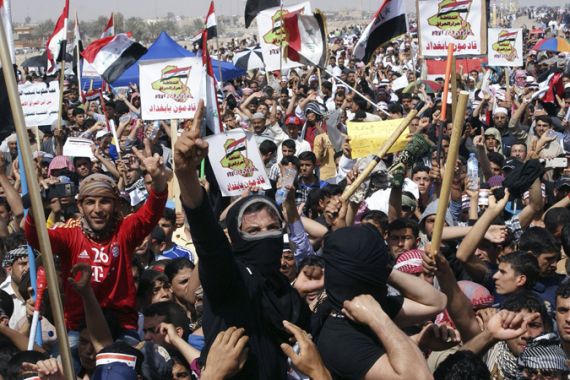Clashes mark Iraq anti-government protests
Police use batons and water hoses as demonstrations against “sectarian policies” erupt in Ramadi, Samara and Baghdad.

Protesters have clashed with police in a wave of anti-government protests to hit at least three cities in Iraq, police officials say.
The protests took place on Friday in Ramadi, Samara and Baghdad against what the participants described as government sectarian policies that target Sunni Muslims.
Anti-riot police in Baghdad used batons and water hoses in order to prevent worshippers from crossing a bridge leading to the most venerated Sunni mosque in the capital, located in the primarily Sunni neighbourhood of Azamiyah.
The officials, speaking on condition of anonymitiy, said several worshippers sustained bruises and minor injuries in the skirmishes at the bridge, about 2km from the Abu Hanifa mosque.
Iraqi security forces had prevented worshippers from holding Friday prayers at the mosque last week as well, a development that reflects heightened sectarian tensions nearly a decade after the US invasion of Iraq.
‘Showered with water’
Abdul-Rahman al-Azzawi was among of a group of people who tried to cross the 14th of Ramadan bridge when they were met by security forces.
“We were showered with water and the policemen started to beat us,” he said.
“I do not know the reason behind this savage attack. We were only going to a mosque, not to al-Maliki’s office in the Green Zone,” referring to the heavily secured quarter in the center of Baghdad where many officials have their offices.
The clashes did not reach the Abu Hanifa mosque itself.
The area around the holy site was calm and hundreds of people, including Osama al-Nujaifi, the Sunni speaker of Iraq’s parliament, attended the Friday prayers there.
During the sermon in Abu Hanifa, Ahmed Haasan al-Taha, a Sunni religious leader, criticised the restriction of movement imposed on worshippers.
“Several days ago, the authorities promised us that they would provide the people free access to Abu Hanifa, but once again the government officials failed to live to their promises,” Taha said.
Anbar protests
In the western province of Anbar, the heart of the protest movement that began in December, masked men arrived at the site of demonstrations in Fallujah raising the flag used by predominantly Sunni fighters in neighbouring Syria.
They also held aloft a homemade black banner flag very similar to that used by al-Qaeda’s branch in Iraq, suggesting that supporters of the armed group are trying to make their presence felt in the largely peaceful Sunni protests.
The protests in Sunni Muslim-majority areas were sparked by the arrest of bodyguards assigned to Rafia al-Issawi, Iraqi finance minister, in late December.
Sunni protesters complain they suffer from discrimination by the Shia-led government of Nouri al-Maliki.
In a separate development, armed men in the city of Baquba broke into the house of Khalil Mohammed, a local leader in the Sahwa Awakening movement, and killed him along with three of his sons, according to police and hospital officials.
Baquba is 60km northeast of Baghdad.
The pro-government Sunni group, known as Sahwa, joined forces with US troops to fight al-Qaeda during the Iraq war.
Since then, the group has been a target for Sunni fighters who consider its members to be traitors.